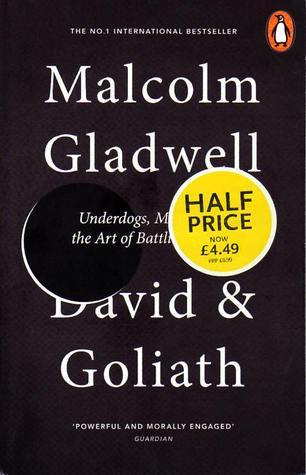What do you think?
Rate this book


305 pages, Paperback
First published October 1, 2013
"...false facts are highly injurious to the progress of science, for they often endure long; but false views, if supported by some evidence, do little harm, for everyone takes a salutary pleasure in proving their falseness; and when this is done, one path toward errors is closed and the road to truth is often at the same time opened."





[W]e consistently get these kinds of conflicts wrong. We misread them. We misinterpret them. Giants are not what we think they are. The same qualities that appear to give them strength are often the sources of great weakness.David and Goliath explores these ideas in a wide array of areas. As is usual in Mr. GladwellŌĆÖs books, there are discussions of psychological and social science research into various issues surrounding schools and parenting, learning disabilities and the differences between capitalization learning and compensation learning. ThereŌĆÖs also a surprising amount of history here, ranging from the story of David and Goliath, to the impressionist masters of late-19th century France, to the Blitz and Vichy France, to the 1960s American Civil Rights movement. Indeed, the discussion of LondonersŌĆ� reaction to the Blitz, and how those who did not suffer direct hits or near misses soon began to feel a sense of invincibility from their remote misses, felt very prescient about how too many people reacted to the pandemic.
"...if you want to see the positive effects of elite schools on self-concept, you are measuring the wrong person. You should be measuring the parents."
Courage is not something that you already have that makes you brave when the tough times start. Courage is what you earn when you've been through the tough times and you discover they aren't so tough after all.He shows how the Germans thought that the bombing would traumatize the city. Instead, it made the British more courageous than ever before.